Posted June 27, 2024 by Tiffany Lee
In case you missed these stories highlighting research and creative activity at the University of Nebraska-Lincoln, the Office of Research and Economic Development’s communications team has compiled a roundup of some recent top stories from research.unl.edu and other sources.
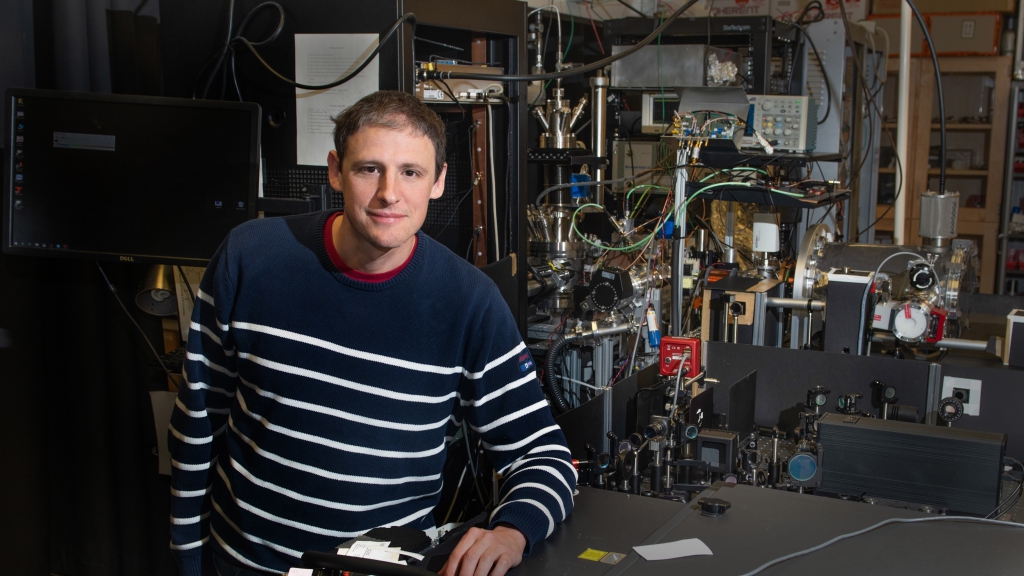
Husker physicist part of team that captures groundbreaking ‘molecular movie’
Who: Martin Centurion, Carl A. Happold Professor of physics and astronomy, and an international research team
What: Centurion helped produce a first-of-its-kind animated movie showing how molecules are structurally changed by light. The minute-long “molecular movie” is an important step in confirming theoretical predictions with actual experiments. Light-triggered molecules produce chemical energy and heat, driving a variety of chemical reactions, such as vision and photosynthesis. But scientists don’t have a comprehensive understanding of these fast, atomic-scale reactions. The movie is a step toward filling this gap. Capturing the structural changes of a light-excited molecule helps pave the way for designing new molecules to carry out functions like the capture and storage of solar energy, and the ability to control the outcome of chemical reactions.
“What will come out of our research is a better understanding and more accurate models of molecular reactions triggered by light,” Centurion said.
Writer: Dan Moser, Office of Research and Economic Development
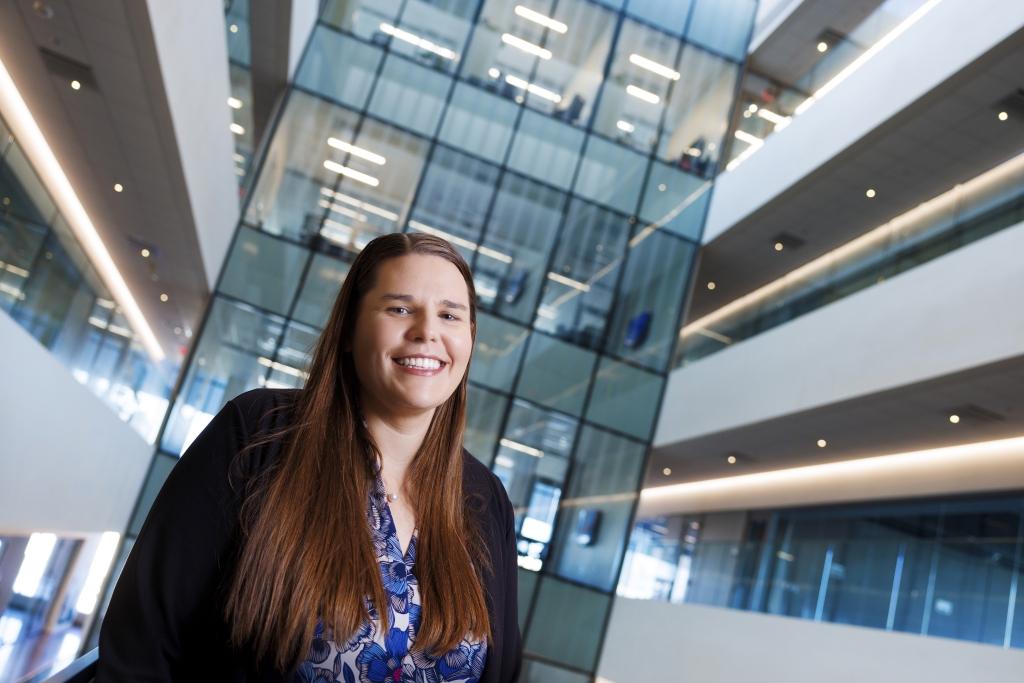
Panther earns CAREER award to improve engineering educati./research on
Who: Grace Panther, assistant professor of engineering education
What: Panther is using a $650,000 grant from the National Science Foundation’s Faculty Early Career Development Program to develop methods of teaching engineering that enable students with a wide range of visuo-spatial skills to earn an engineering degree and join the STEM workforce. Currently, visuo-spatial skills – the ability to manipulate, organize and make sense of spatial relationships – are central to succeeding in engineering classes. Through interviews and observation, Panther will study how students from across the visuo-spatial skill spectrum navigate engineering coursework and how visuo-spatial language and gestures are embedded in civil engineering courses. To translate this research into practice, student interviewees and engineering instructors will come together to co-develop new course materials that are accessible to all students.
“The end goal is creating methods of teaching that, regardless of your spatial skills, you can still be successful,” Panther said. “The presentation of content shouldn’t rely so heavily on a single skill.”
Writer: Tiffany Lee, Office of Research and Economic Development
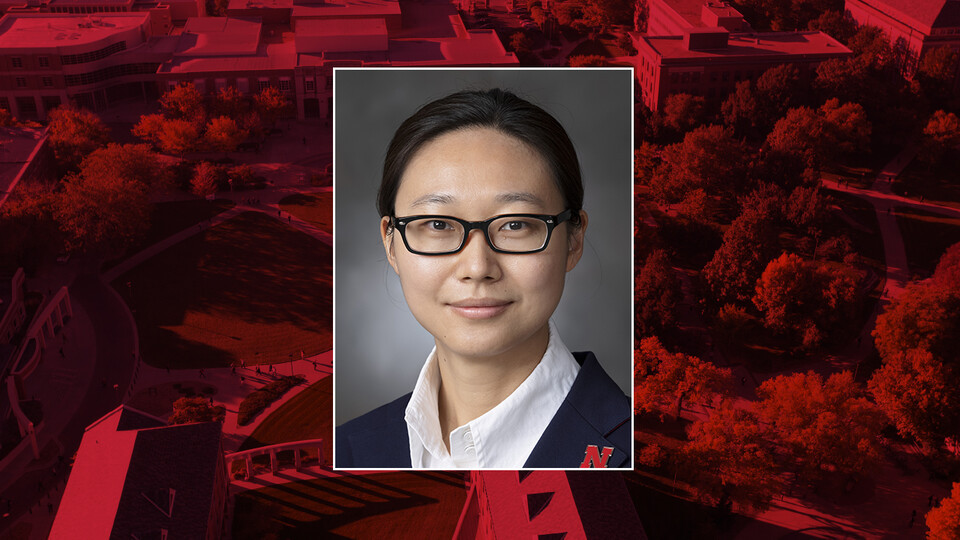
Nie’s CAREER project tackles spectrum scarcity, rural digital divide
Who: Shuai Nie, assistant professor of computing
What: With an $812,995 grant from the National Science Foundation’s Faculty Early Career Development Program, Nie is working to help meet the ever-growing demand for wireless and broadband connectivity. She is exploring how to open the terahertz frequency range to everyday users, particularly in rural areas, where internet access is especially scarce. Her project will establish the Midwest’s first testbed to measure and test terahertz-frequency networks, which must be designed to withstand a constantly evolving environment. Factors prevalent in agricultural settings, like weather fluctuations and crop growth, influence these networks’ function.
“We want to capture these kinds of changes so we can design more accurate channel models and algorithms that can accommodate these different variations,” Nie said. “Ultimately, if we develop a solution that accurately reflects reality, then customers don’t have to pay extra money for overhead that comes with redundancy. This is critical for future network design, especially in rural communities.”
Writer: Tiffany Lee, Office of Research and Economic Development
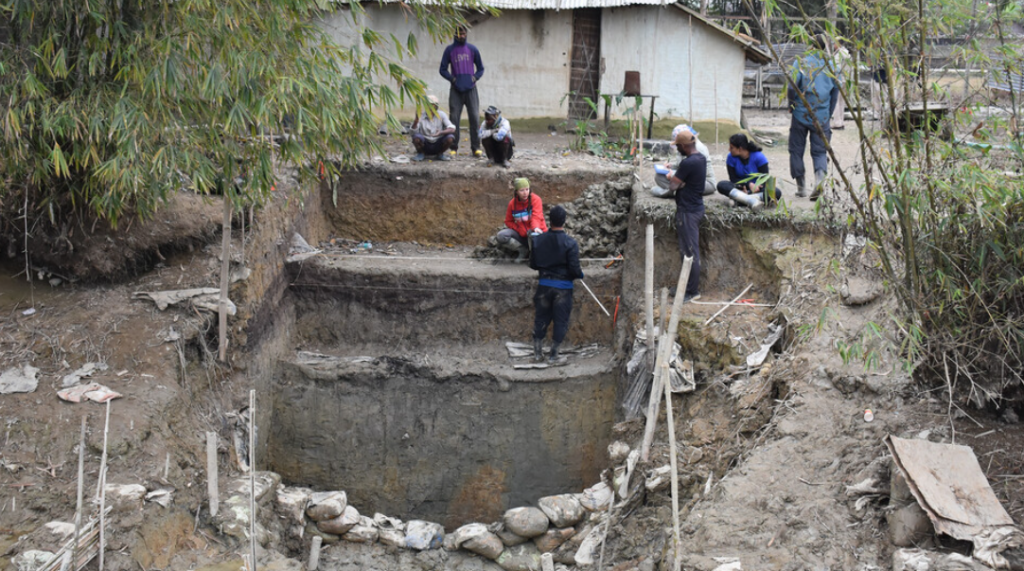
Belcher earns Fulbright to train new forensic anthropologists
Who: William Belcher, associate professor in the School of Global Integrative Studies
What: For more than two decades, Belcher has led or assisted in the excavation and recovery of aircraft and service members who served during World War II. Belcher recently earned a U.S. Fulbright-Nehru Distinguished Scholar Award to advance this work. He will partner with the National Forensic Sciences University in Gandhinagar, India, to lead specialized training for 10 students in India, preparing them to complete forensic excavations. These students will be equipped to assist the Department of Defense in recovering missing-in-action U.S. service members and aircraft in areas that are inaccessible to American excavation teams. Belcher hopes that in the future, Husker students can participate in the training through a student exchange partnership.
“This will build capacity in the number of people who will be able to excavate U.S. crash sites on the behalf of our government,” Belcher said.
Writer: Deann Gayman, University Communication and Marketing
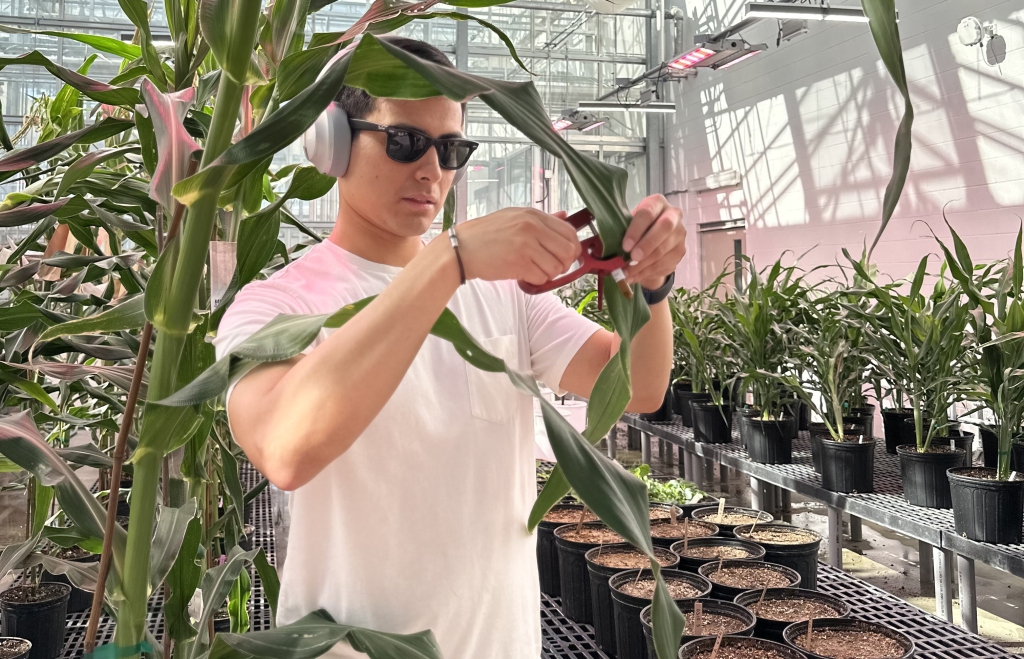
Nebraska team develops technique to speed up corn gene identification
Who: Vladimir Torres-Rodriguez, postdoctoral associate in the Center for Plant Science Innovation; James Schnable, Nebraska Corn Checkoff Presidential Chair and Professor of Agronomy and Horticulture
What: Though it’s been 15 years since the first draft of the corn genome was published, the functions of the majority of these genes remain unknown. Torres-Rodriguez developed and tested an innovative, RNA-focused gene-analysis method aimed at helping scientists identify the job of each gene. His technique, which combines RNA data with measurements of the corn plants themselves, identified about 10 times as many corn genes affecting flowering time than widely used DNA-based methods. This strategy could lead to faster development of resilient corn varieties. The work was supported by a $650,000 grant from the U.S. Department of Energy’s Advanced Research Projects Agency-Energy program.
“We want to be, and we’re becoming, the place where people from across the country come to get cutting-edge corn research done,” Schnable said.
Writer: Geitner Simmons, Institute of Agriculture and Natural Resources
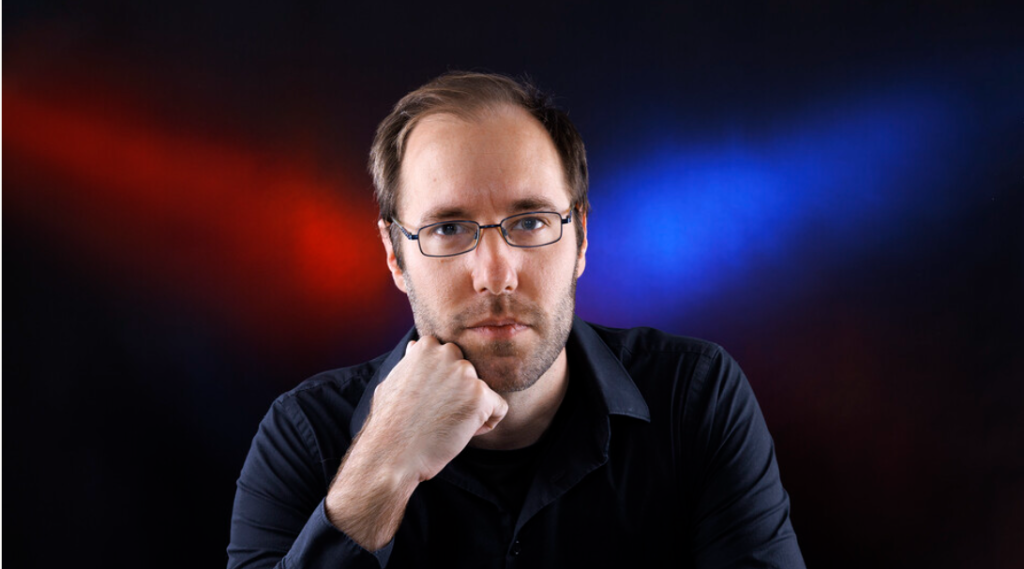
Study shows politicians deny misdeeds because we want to believe them
Who: Pierce Ekstrom, assistant professor of political science
What: Ekstrom led a recently published study suggesting that politicians lie and deny during political scandals because their supporters prefer a less-than-credible denial to losing political power and in-group status due to a discredited party leader. In three separate experiments conducted since 2013, thousands of participants indicated they would continue to support a politician despite hostile denials of wrongdoing – particularly if the politician were a powerful member of their political party. The study, published in the Personality and Social Psychology Bulletin, sheds light on why partisans appear to have different standards for different politicians.
“Certainly, there’s a very strong norm — and it may be stronger now than it ever has been — to stand behind the leader of the party. The more important and more indispensable a politician seems to be to the party, the more committed people are going to be toward defending that politician and seeing that politician defend themself,” Eckstrom said.
Writer: Leslie Reed, University Communication and Marketing
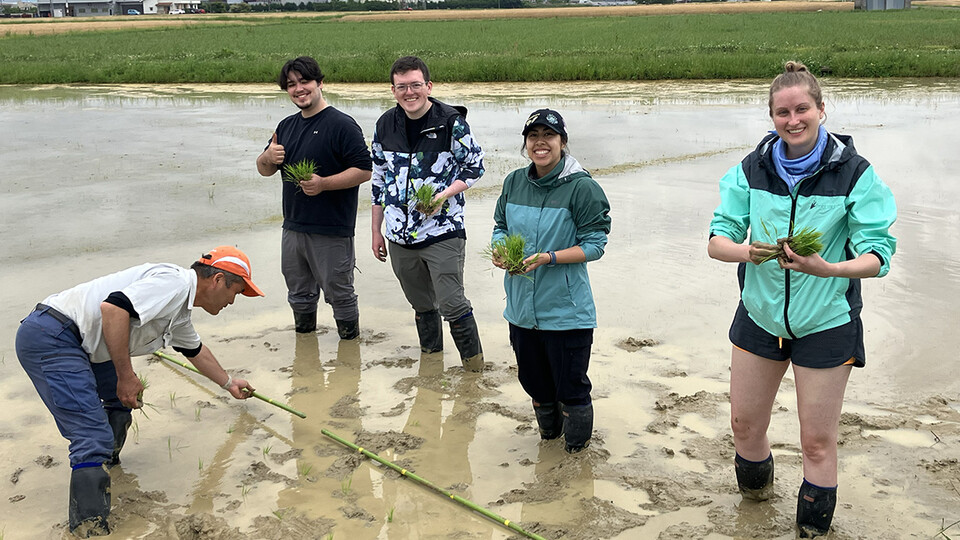
Three Huskers focused on summer research in Japan
Who: Sangjin Ryu, associate professor of mechanical and materials engineering; Nebraska undergraduate students Laurel Wagner, Jonathan Janecek and Rachel Wagner; Christian Sunderland, Nebraska Wesleyan student
What: Ryu is leading the student engineers on a nine-week research experience in Japan, a venture funded by the National Science Foundation International Research Experiences for Students program. They are conducting research on using microfluidics and image sensors to develop portable diagnostics devices; visiting local Japanese companies like Kawasaki; and gaining experience collaborating with people of other cultures. Ryu said one goal is to strengthen collaboration between Nebraska and Japanese universities.
“I’ve heard from my Japanese colleagues that their universities are always looking for international collaborators because their government puts a lot of weight on globalization of their academic institutions,” Ryu said. “That means more opportunities for our students to participate in exchange programs and develop global experience as well.”
Writer: Karl Vogel, College of Engineering

Website creates online market for Indigenous entrepreneurs
Who: Timothy Thielen, program coordinator for the Native American Coalition; Ted Hibbeler, Extension educator with Rural Prosperity Nebraska and director of the Native American Coalition
What: The Institute of Agriculture and Natural Resources and the Native American Coalition, both housed at the university, have launched a new website providing business development aid for Indigenous entrepreneurs. The site, called the Turtle Island Trade Coalition, provides support and resources for Native food producers who want to expand their customer base and business reach. Funded by the U.S. Department of Agriculture’s $25 million Regional Food Business Center Grant awarded to Rural Prosperity Nebraska in 2023, the website also enables entrepreneurs to showcase and advertise their products. More broadly, the website is a step toward overcoming generations of struggle with Indigenous food sovereignty.
“A lot of the issues facing our current lack of resilience in our food system can be addressed by providing resources and education to Indigenous peoples, to continue to practice their traditional ways of living,” Thielen said.
Writer: Russell Shaffer, Rural Prosperity Nebraska






